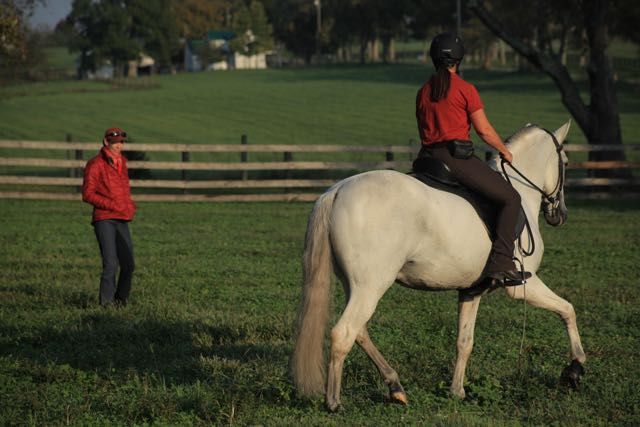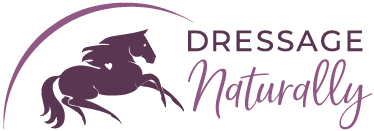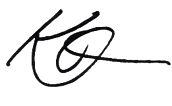How to be open to instruction, yet true to yourself.
Being an excellent student is an art.
There are a lot of factors that go into having valuable lessons with your horse. As an instructor I accept a large chunk of the responsibility for the lesson because the choices I make can set a student up for success or failure. If I ask too much I risk them losing confidence, and if I don’t challenge enough I risk them being bored, or simply not progressing. When I choose to give them a rest, or how I choose to describe something, or even my tone of voice, posture, and attitude all effect the experience for horse and rider.
I have taken a lot of lessons and I have given a lot of lessons. I have put a lot of thought and effort into being the best teacher I can be, with all the nuances that go with that. But the burden of experiencing a great lesson is not all on the instructor.... It takes an equal amount of effort from the student. Being a great student (and by ‘great’ I mean that you are able to get the most out of the lesson you are in) requires balancing being totally open to the instructor, yet remaining ultimately responsible for you and your horse’s experience.
The less experience you have, the easier it is to be open because you don’t have a lot of your own ideas (in theory... Lack of experience makes some students become defensive or self-conscious), but the harder it is to be responsible for your riding; less experienced students often assume that they don’t know what to do so they just wait to be told. The more experience you have, the more chance you will be able to be responsible for your riding, but you can find yourself second-guessing, or over-analyzing the lesson in the moment. The magic happens when you can balance the two dynamics of openness to suggestion, yet responsible for your actions.
How to Find the Magic!
I will go through a list of the 6 steps that will lead to you finding this magic. As you read, notice if there are some points that you never thought of before, or would find impossible... If you want to improve your lesson quality, chances are, those are the areas you will need to explore!

1. Find an instructor you trust.
Your instructor does not have to be your friend, and your instructor doesn’t have to be perfect at absolutely everything to do with horses.... But he or she needs to be someone you trust in the area that they are helping you with. You need to feel you are in a safe learning environment. If you are feeling berated, or that you would ‘get in trouble’ during your lesson you will be on the defensive in some way and that will block your ability to learn. Your horse will also feel this. If your horse feels you becoming tight and defensive, he feels a tense predator on his back and will also become tight and defensive. Do not take instruction from individuals that you don’t trust.
2. Don’t bring your ‘issues’ into your lesson.
Most of the blocks I see students experiencing come from things not at all related to horses. You need to be able to clear your stress. If you are feeling like ‘no one listens to you’, or ‘you can’t do anything right’, or ‘you have to be perfect’ you are setting yourself up for failure. By ‘failure’ I mean that you will be working against yourself, that you will not be able to be ‘in the moment’ with your horse, and you will not be able to really hear and take in what your instructor is saying. Judgements and negative chatter in your mind act like little road-blocks. Do what you need to do to clear them. Also remember that the key is for messages to go through you and come out your horse. Being overly dramatic, or emotional, or hyper make the ride all about you, when it is supposed to be all about the horse.
3. The harmony between you and your horse is your responsibility.
Without harmony, nothing can move forward. The harmony between you and your horse is what your horse cares about the most. If disharmony is the biggest problem you have with your riding, then that is what the lessons need to be about. Make sure you are with someone who is helping you with that instead of someone who is enabling you to keep struggling and fighting with your horse.
This also means that you need to see you and your horse as a team that is getting help from your instructor... It is not about you and your instructor teaming up against your horse. With that said, I have sought instruction for help with really challenging horses, but it is still important to feel like the instruction is there to help me and the horse understand each other better. It is an attitude difference that the horses really feel.
Being responsible for the harmony also means that if you are feeling things the instructor isn’t seeing you still acknowledge it to the horse... That you reward the ‘try’ even if the instructor just sees a movement that came out ‘wrong’... And that you still keep a standard for responsiveness even if the instructor says it ‘looks good’. Read the next point to see how you can do that without feeling like you are conflicting with your instructor.
4. Open all the lines of communication.
The role of the student is to listen and let the instructors words go through you and be expressed in your riding. However, it is important to feel like you are allowed to ask a question or express something you are feeling. I personally ask my students lots of questions during lessons, and I teach them the questions they need to be asking themselves.
As an instructor who values harmony, I need to know how things are feeling to the student. When I take a lesson I want to feel like I can say something like: “May I give my horse a break for a moment?” if I feel my horse is stressed or confuses, or “May I ask a question about that?” If I find myself confused about what I need to be asking of my horse. I am open to the instructor saying yes, or maybe he will say: ‘I think you need to keep going for a moment because _____”. This is where it is so important to be with an instructor you trust.
5. Do your homework.
Only you can improve yourself. Even if the only time you ride is on a school horse in a lesson, you can still be doing mental homework. It is nice to be open to ‘whatever’ the instructor tells you, but as an instructor it can be very uninspiring when I ask a student what they would like help with and they say: “I don’t know; you just tell me what to do”. Even if you are a beginner there is something you want to learn. Now, your instructor may veto your idea but hopefully they can explain why, and then you will have learned something! There are times I do want to be just directed as a student. If I were to express that to my instructor I might say something like: “Can you run me through some exercises in flow today?”
Sometimes I want my instructor to see what I am doing before they swoop in and ask me to do other things. In this case, as a student, I might say: “Is it alright if I just do what I normally would do and you can give me feedback?” I remember the first time a student suggested that to me, and I admit, I was initially insulted (“I am the teacher, I need to be totally in control of this lesson!”) but it was such a valuable experience for me as the instructor as well as for the student. I can learn about the thought-process of my student! Now when I take a lesson I often request that I am allowed to ride as if I am on my own... And my instructor loves that too! I encourage my students to do this in lessons with me, and I let them know when I am taking over again.
6. No one can ‘apply knowledge or skill to you’. You have to make a decision to seek it.
The bottom line is that in order to be an excellent student you need to be a thinking rider who is aware of what your goals are, what you have played with, what has worked, and what hasn’t. No one can ‘apply knowledge or skill to you’. You have to make a decision to seek it. You have to be hungry for it. MOST of your learning will actually be happening in the moments you are not in your lesson anyway... But only if you are actively practicing it! When you are a student who feels 100% responsible for your learning you will become hyper-alert to the cause and effect of your aids on your horse. You will find a way to understand the ingredients of what you are looking for, and will find teachers who truly want to teach.
That is why I focus less on creating results that look good, or on micro-managing students through lessons that they can never re-create at home... And instead I focus on creating students who learn to be more self-aware, confident, and understand the process of problem-solving. I love to show students the logic, or thought process I use, so they know what questions to ask themselves... The added bonus of doing it this way, is it ends up looking really really good!
Most students underestimate what they are capable of accomplishing on their own. When you are ready to find out just how much you can do seek a teacher who believes in you as strongly as you do (and maybe just a little more than that). Find one who is committed to truly educating you. When you are an engaged student of any level learning is fun, and teaching you is fun. (Your horse will appreciate it too!)
I hope that helps you have some amazing rides and that it allows you to have some amazing lessons! You can do it!



